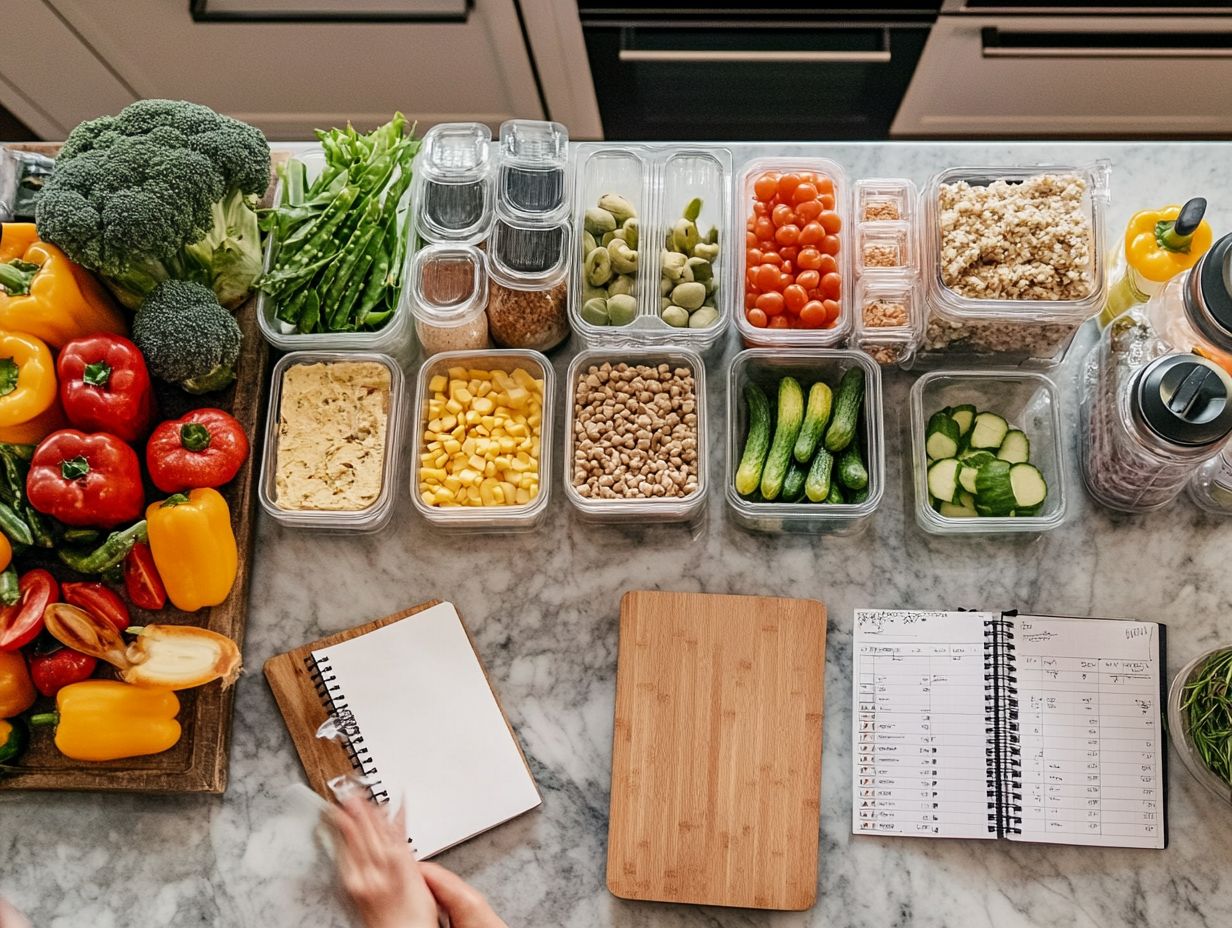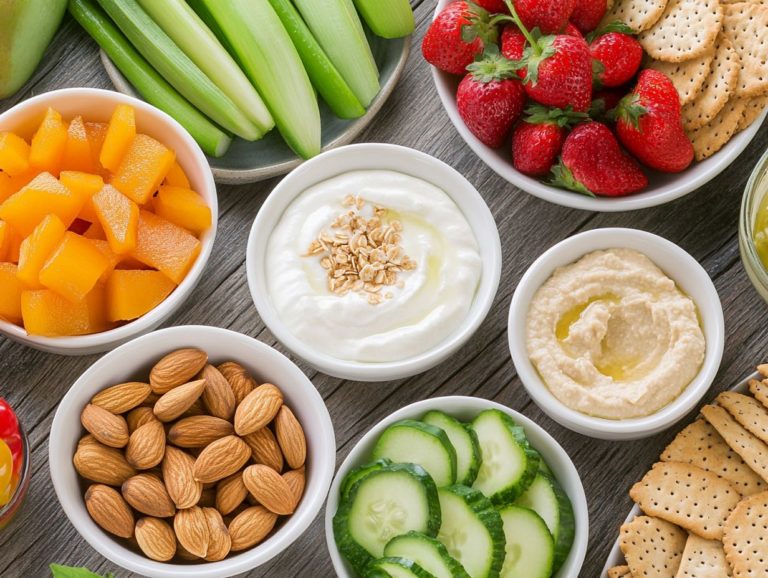How to Plan Meals for Special Diets
Navigating special diets may seem daunting, but it doesn t have to be.
This article will help you master the essentials of meal planning tailored to various dietary needs. You will learn about the nuances of different types of special diets while highlighting crucial elements like nutritional requirements and dietary restrictions.
You ll discover practical meal planning tips to infuse excitement into your meals, alongside effective strategies for meal prep.
You will also find many recipe resources and guidance on how to adapt your favorite dishes to align with any special diet.
Start now and transform your cooking experience today!
Contents
- Key Takeaways:
- Understanding Special Diets
- Factors to Consider When Planning Meals
- Meal Planning Tips
- Resources for Finding Recipes
- Adapting Recipes for Special Diets
- Frequently Asked Questions
- What are special diets and why is it important to plan meals for them?
- How do I identify the dietary needs and restrictions for a special diet?
- What are some common special diets and their requirements?
- How can I plan meals for someone with multiple dietary restrictions?
- What are some tips for successfully planning meals for special diets?
- Are there any resources available to help with meal planning for special diets?
Key Takeaways:

- Understand the different types of special diets, such as vegetarian, gluten-free, and diabetic, to better plan meals for those with dietary restrictions.
- Consider both dietary restrictions and nutritional needs, such as allergies and vitamin deficiencies, when planning meals for special diets.
- Incorporate variety and flavor into meals for special diets by experimenting with spices and ingredients, and utilize meal prep strategies to save time and effort.
Understanding Special Diets
Understanding special diets is vital for anyone looking to tailor their meal planning to specific health conditions, like type 2 diabetes or heart disease. This thoughtful approach can also include meal planning for managing food allergies and other dietary restrictions.
This will help you make healthy meals that align with your nutritional needs.
By consulting a registered dietitian a professional who specializes in nutrition you gain access to invaluable insights into effective dietary guidelines. This ensures that your meal plans are both comprehensive and inclusive.
Types of Special Diets
There are various special diets crafted to cater to distinct health concerns and lifestyle choices, such as gluten-free, vegan, and Mediterranean diets. Each of these dietary paths offers unique nutritional advantages and can assist you in achieving a range of goals, from weight loss to enhanced heart health.
Understanding the characteristics of these dietary approaches enables you to make informed decisions tailored to your individual needs.
For example, the gluten-free diet is particularly beneficial for those with celiac disease, emphasizing the exclusion of wheat, barley, and rye. It encourages the inclusion of naturally gluten-free grains like quinoa and brown rice.
In the same vein, the vegan diet, abundant in plant-based foods, is associated with lower cholesterol levels and improved digestion. Think hearty lentil soups and vibrant chickpea salads.
The Mediterranean diet, renowned for its heart health benefits, centers around whole grains, healthy fats from olive oil, and an abundance of fruits and vegetables. Picture delightful dishes like grilled salmon with quinoa and roasted vegetables.
Registered dietitians are essential in this journey, offering personalized meal planning strategies and ample support for anyone looking to adopt these diets effectively.
Factors to Consider When Planning Meals
When planning your meals, it’s essential to consider several factors to ensure the food you prepare aligns with your dietary restrictions and nutritional needs. Pay attention to portion sizes.
Think about whether you prefer to tackle grocery shopping or lean towards the convenience of food delivery services. Both approaches can greatly enhance your meal planning experience, making it not only efficient but also tailored to your lifestyle.
Dietary Restrictions and Nutritional Needs

Dietary restrictions are essential factors to consider when planning meals, particularly for those with food allergies or chronic health conditions.
Understanding these restrictions helps create nutritious meals tailored to specific needs. A registered dietitian can help optimize this process.
Grocery shopping can feel overwhelming when faced with common dietary restrictions like lactose intolerance, nut allergies, or veganism. The endless options may leave you unsure, but a bit of preparation can transform your shopping experience.
For example, if you’re avoiding dairy, exploring plant-based alternatives can introduce a delightful array of flavors. If you have nut allergies, diligently reading labels will help you spot hidden allergens.
Consulting a registered dietitian offers personalized meal guidance and arms you with strategies to make informed choices in the grocery aisle. This approach can lead to a more enjoyable and stress-free meal planning experience.
Meal Planning Tips
Effective meal planning tips can elevate your culinary experience, making it easier to create nutritious and delicious meals while staying within budget and managing portion sizes.
By embracing meal prep strategies and exploring healthy recipes, you can enhance your cooking journey and cultivate lasting healthy eating habits.
How to Incorporate Variety and Flavor
Incorporating variety and flavor into your meal planning keeps your interest in healthy eating alive. Experimenting with herbs and spices elevates your dishes while meeting your nutritional targets.
Explore different cooking techniques like roasting, grilling, or saut ing to unlock exciting new dimensions of flavor in your meals. Marinating proteins in a blend of garlic, ginger, and citrus tenderizes them and infuses your dishes with a vibrant zest that s hard to resist.
Fresh herbs like basil, cilantro, and thyme intensify flavor while offering health benefits like improved digestion and reduced inflammation. Planning meals with a diverse array of ingredients tantalizes your palate and keeps your nutritional profile in check, transforming healthy eating into an enjoyable experience.
Meal Prep Strategies
Adopting effective meal prep strategies can drastically cut down your time in the kitchen, allowing you to effortlessly weave healthy meals into your bustling schedule.
Utilizing meal prep containers is a game-changer, providing convenience by storing prepared dishes for quick access throughout the week.
This approach simplifies your daily cooking routine and cultivates healthier eating habits by ensuring nutritious food is always within reach. Techniques like batch cooking, which means preparing large quantities of food at once, and pre-portioning meals enhance your efficiency.
This method minimizes food waste and makes managing your portions a breeze. Investing in high-quality meal prep containers is key to preserving the freshness and flavor of your meals.
These versatile containers work seamlessly with your grocery shopping and food delivery, presenting you with a well-rounded strategy for maintaining a wholesome diet.
Resources for Finding Recipes

Discover a treasure trove of resources right at your fingertips for finding delicious, healthy recipes that accommodate a variety of diets and preferences, whether you prefer the tactile experience of cookbooks or the convenience of online sources.
By utilizing a meal planning app, you can streamline the process of exploring new dishes while organizing your meal prep with remarkable efficiency.
Cookbooks and Online Sources
Cookbooks and online resources are invaluable for uncovering a diverse range of healthy recipes tailored to your specific dietary needs and preferences. They can ignite your meal planning inspiration and expand your culinary repertoire.
As the focus on health continues to grow, a variety of cookbooks have emerged to cater to specific diets. For instance, “Thug Kitchen” delights vegan enthusiasts, while “The Whole30” serves those looking for a fresh start.
Online platforms like Allrecipes and Epicurious boast extensive collections of user-generated recipes. You can easily filter these options based on dietary restrictions. This helps you find the right options easily.
Use these resources to simplify your meal planning while unleashing your creativity in the kitchen. You can make health-conscious choices while exploring exciting new flavors and ingredients.
Adapting Recipes for Special Diets
Adapting recipes for special diets requires thoughtful substitutions and modifications. This approach is essential for accommodating dietary restrictions, whether it s gluten intolerance or veganism, while still delivering satisfying and healthy dishes.
Substitutions and Modifications
Substitutions and modifications are essential when adapting recipes for those with food allergies or specific dietary restrictions. By using smart cooking tips, you can discover the best alternatives to common ingredients without sacrificing taste or nutrition.
For example, swapping out dairy for nut milk can deliver that creamy texture while accommodating lactose intolerance. Opting for gluten-free flour blends can unlock a realm of baking opportunities for individuals with celiac disease, a serious gluten intolerance. You might also find that flaxseeds or chia seeds serve as excellent egg replacements in vegan baking.
Modifying traditional recipes can be an adventure. Challenges like nailing the right consistency in sauces or ensuring baked goods rise to perfection may arise. However, the satisfaction of crafting a delightful dish that meets everyone’s needs is truly rewarding.
Embrace an open mind throughout the journey. Experiment with various flavors; you may just stumble upon some delightful culinary surprises.
Frequently Asked Questions

What are special diets and why is it important to plan meals for them?
Special diets are eating plans that are specifically tailored to meet the dietary needs and restrictions of individuals with certain health conditions or dietary preferences. Planning meals for special diets is important to ensure that these individuals are getting the necessary nutrients and to avoid triggering any health issues.
How do I identify the dietary needs and restrictions for a special diet?
The best way to identify dietary needs and restrictions for a special diet is to consult a healthcare professional or a registered dietitian. They can assess the individual’s medical history and provide guidance on the appropriate diet plan.
What are some common special diets and their requirements?
Common special diets include gluten-free, dairy-free, vegetarian, vegan, and keto diets. Gluten-free diets require avoiding gluten-containing foods like wheat, barley, and rye. Dairy-free diets eliminate dairy products such as milk and cheese. Vegetarian and vegan diets exclude meat and animal products, while keto diets involve high-fat, low-carb eating.
How can I plan meals for someone with multiple dietary restrictions?
Planning meals for someone with multiple dietary restrictions can be challenging, but it is possible. Focus on whole foods that are naturally free from the restricted ingredients and get creative with substitutions. For specific guidance, refer to a resource on how to plan meals for a gluten-free diet and consult a registered dietitian for personalized meal planning advice.
What are some tips for successfully planning meals for special diets?
Some tips for successfully planning meals include meal prepping, trying new recipes, and being open to substitutions. For those following a plant-based diet, meal planning for a vegan lifestyle becomes especially important. It is also crucial to read food labels carefully and to communicate with the individual about their food preferences and restrictions.
Are there any resources available to help with meal planning for special diets?
Absolutely! There are plenty of resources to help you with meal planning for special diets.
Look for specialized cookbooks and online recipes tailored to your dietary needs. Meal delivery services can also bring convenience to your cooking.
Joining online communities or support groups can provide extra tips and encouragement as you navigate your special diet.






